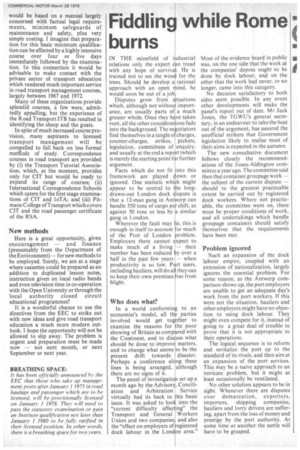Fiddlinçj while Rome burns
Page 35

If you've noticed an error in this article please click here to report it so we can fix it.
IN THE minefield of itidustrial relations only the expert c n tread with any hope of survivaL He is trained not to see the wood for the trees. Should he develop a rational approach with an open ind, he would soon be out of a job Disputes grow from s tuations which, although not withou importance, are usually parts of a much greater whole. Once they have taken root, all the other considerafons fade into the background. The negotiators find themselves in a tangle o charges, counter-charges, strikes, pickets, legislation, committees of enquiry, and usually at the end a rep rt iwhich is merely the starting point for further argument.
Facts which do not fit into this framework are played own or ignored. One statistic whi h might appear to be central to he longdrawn-out London dock ispute is that a 12-man gang in Ant erp can handle 350 tons of cargo pe shift, as against 50 tons or less by similar gang in London.
Wherever the fault may ie, this is enough in itself to account or much of the Port of London roblem. Employers there cannot xpect to make much of a living — their number has been reduced y over a half in the past few years — when productivity is so low. P rt users, including hauliers, will do al they can to keep their own premises ree from blight.
Who does what?
In a world conformin to an economist's model, all th parties involved would get tog ther to examine the reasons for he poor showing of Britain as comp red with the Continent, and to dis uss what should be done to improv matters, and to change what seems to be the present drift towards disaster. Perhaps a conference al ng these lines is being arranged, although there are no signs of it.
The panel of investigatio1 set up a month ago by the Advisory, Conciliation and Arbitration Service virtually had its back to his basic issue. It was asked to loo into the "current difficulty affec ing" the Transport and General Workers Union and two companies and also the "effect on employers of egistered dock labour in the London area." Most of the evidence heard in public was, on the one side that the work at the companies' depots ought to be done by dock labour, and on the other that the work had never, or no longer, came into this category.
No decision satisfactory to both sides seem possible. In any event other developments will make the panel's report out of date. Mr Jack Jones, the TGWU's general secretary, in an endeavour to take the heat out of the argument, has assured the unofficial strikers that Government legislation likely to realise most of their aims is expected in the autumn.
The new consultative document follows closely the recommendations of the Jones-Aldington committee a year ago. The committee said then that container groupage work — the subject of the current dispute — should to the greatest practicable extent be carried out by registered dock workers. Where not practicable, the committee went on, there must be proper conditions of work, and all undertakings which handle groupage containers should satisfy themselves that the requirements have been met.
Problem ignored
Such an expansion of the dock labour empire, coupled with an extension of nationalization, largely ignores the essential problem. For some reason, as the Antwerp comparison shows up, the port employers are unable to get an adequate day's work from the port workers. If this were not the situation, hauliers and other employers might have no objection to using dock labour. They might even compete for it, instead of going to a great deal of trouble to prove that it is not appropriate to their operations.
The logical sequence is to reform and revitalize the port up to the standard of its rivals, and then aim at an expansion of the port services. This may be a naive approach to an intricate problem, but it might at least occasionally be ventilated.
No other solution appears to be in sight. Whenever there are disputes over demarcation, exporters, importers, shipping companies, hauliers and lorry drivers are suffering, apart from the loss of money and prestige by the port authority. At some time or another the nettle will have to be grasped.




























































































